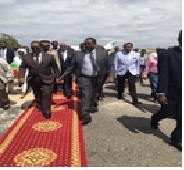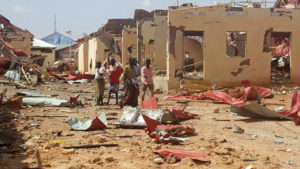By Faisal Roble
Win the Political power first, then follows the economy, said Kwame Nkrumah. Likewise, eliminate terror first, then follows healthy civic culture and expanded political space .

President Hassan Sheikh Mahmoud’s visit to Jigjiga marks a paradigm shift in the Ethio-Somali relations. It is the first time in history that a sitting Somali President officially visits the Somali inhabited region of Ethiopia, and this comes at a time when the region has a self-rule within an ethnic-based federal system (Dawlad Deegaanka Soomaalida Itobiya). The visit was facilitated by the PM of Ethiopia and by his Foreign Minister, who mingles well with Somalis in the Diaspora. Somalis will be debating the merits and demerits of the visit for many years to come. That is not the focus of this piece. Alas, I am focusing on security related lessons that Mogadishu could learn from Jigjiga. More on this later.
Received at Wiilwaal Airport with a red carpet by the President of the Somali Regional State, Abdi Mahmoud Omar, Hassan Sheikh Mahmoud was taken in a motorcade to the statehouse past the newly erected symbolic statue of Sayyid Mohamed Abddille Hassan. The meeting between the two Somali sides comes at a momentous time, especially when Hassan Sheikh Mahmoud’s government is in painful bind with Alshabab terrorists.
If President Hassan Sheikh Mahmoud has learned one or two lessons from his visit to Jigjiga, it better be how to implement measures that help defeat religious-based terrorism, lest the Somali Regional State succeed exactly to do that.
Prior to the meeting of the two sides, President Abdi Mahmoud Omar gave an interview to Cakaratv, a locally run TV station, where he chided “riot instigators” in the northern part of the Country. He strongly rebuked the futile attempts by the forces of what he termed “chauvinists” (“timkitanyoch”) to reverse the motion of federalism in his country. This sentiment is widely echoed by an overwhelming majority of Somalis in Ethiopia and elsewhere.
This is so mainly because the long and past memories of national oppression and subjugation of Somalis prior to 1991, under an archaic feudal system akin to black colonialism that never recognized the rights of the 6 million Somalis, is still fresh in their memories. An ideology of “chauvinism” disguised as “democracy” or infantile expansionist disorder and shrill vision towards Somali territories is not solace to Somalis.
Oromia has already annexed large swath of districts that belonged to Somalis; the specter of the return of “chauvinists” and/or infantile “expansionist” ideologies is all the more unsettling to Somalis.
The conversation between the two in Jigjiga could not have come at a better time. In the long run, stable Somalia could perhaps be a key allay to the Somali Regional State in a united front against the forces of “chauvinism.” Where the two can possibly cooperate, if and when possible, must be the fight against Alshabab. Today no enemy is worse than Alshabab. So says a recommendation report submitted to President Hassan Sheikh Mahmoud by “Somali Islamic Scholars” that “denounced Alshabab” in a 2013 “Fatwa.” Like many recommendations, this one is collecting dust.
Somalia, a war torn country, is plagued by a runaway terrorism which is making national recovery efforts nearly impossible. Not only does the cloud of terror blanket Mogadishu permanently, but the City has also become a soup of terror infrastructure.
Equally worrisome is that in recent years the network of terror has been making inroads into the hitherto peaceful regions such as Puntland, this in spite of regular massive drone attacks by US army that have otherwise successfully taken down AlShabab leaders.

For the first time in memory, on August 21, 2016, Galkayo, the largest city in Puntland, has been rocked by suicide bombers killing about 30 civilians and wounding another 60, including women and elderly. To the chagrin of Puntlanders, terror network in their midst is now as real as it has been in Mogadishu. Today, Galkayo looks much like Mogadishu, a realty that was unthinkable 2 years ago.
Remarkably, terrorism is absent in the cities of the Somali Regional State. Jigjiga today is as peaceful of a city as any urban setting in the West; on the other hand, Mogadishu is under a stern chokehold by a well-organized and well-financed soup of terror network that goes beyond the ranks of Alshabab. The terror network that is plaguing Somalia is a tripartite force comprising Arabian petro-dollar, entrenched extremist clerics in neighboring countries, and terror mission honchos in Mogadishu.
What is it, therefore, that Jigjiga is doing right that Mogadishu or Garowe, is not? First, Somalia needs to delink itself from the influence of Arab petro-dollar and imported Wahhabism. Second, both Mogadishu and Garowe have yet to muster enough political will to implement best practices to fight terror.
Of course, Somalia may not eliminate terrorism against soft targets any time soon, but with the right tools implemented it should be able to disrupt the organizational, financial and ideological network of terrorism that reside in the hands of known extremist clerics.
President Hassan Sheikh Mahmoud and President Abdi Mahmoud Omar reportedly exchanged views on best practices to contain, if not eradicate, terrorism. Can Mogadishu turn to Jigjiga for anti-terror and anti-Alshabab best practices?
Remember, it was not too long ago when terrorists were so bold to carry out devastating operations in Jigjiga, Diredhabe and elsewhere. Today, it is difficult, if not impossible, for extremist groups like Alshabab to do so. The turning point in the history of organized terrorism in Jigjiga was marked by this statement uttered by a member of the regional government following one nasty terrorist operation:
“Ninka Dirdhabe Qarxinayaa, dee waa nin Jigjiga Soomaray, oo Ilayn meel kale ma soo marine.”
“The person who is committing terrorism in Dridhabe must have passed through Jigjia.”
Soon, the city’s residents were mobilized and a policy of zero tolerance to the culture of terror was institutionalized. Instead, the era to stamp off terrorism by implementing what I call the “3Ms” of anti-terrorism, that which Hassan Sheikh Mahmoud’s government has yet to implement, commenced in earnest.
Moderate Islam: Real Islam is tolerant but has zero room for extremist religious propaganda that seeks to inculcate a wrong version of Islam among the youth and the dispossessed masses. Promoting real Islam was a key to defeating terrorism in the Somali Regional State.
Monitoring and working side by side with mosques, their Imams and traditional leaders is a cornerstone to having a tolerant and enlightened Islam spread by Somali clerics. The time-test political cooptation and accommodation was institutionalized.
In the same vein, without being too prescriptive, Mogadishu should require of its mosques to promote peace and harmony, not division and discordant views about Islam in the society. Somalia can’t afford her Islam be controlled from oversees. Delinking Somalia from the chokehold of Arab petro-dollar is a must.
Mass Mobilization: The second “M” of anti-terror best practices that are implemented in Jigjiga include mass mobilization. Five years ago, in a debate at the VOA Somali section, I argued that Mogadishu’s residents are not mobilized. The city still remains Immobilized. When the masses are immobilized, community policing is impossible to carry out. This void has resulted in the narrowing, if not total erosion, of civic culture and political space for the Nation’s host city.
Reeling from a devastating civil war, Mogadishu is mecca for arms proliferation and it serves as a cottage industry in the production and assembling of suicide bombs and grenades. There is a widely held belief that terror networks are embedded in all levels of Hassan Sheikh Mohamed’s government. Thus, the soup of terror network cannot be dismantled without full community mobilization and without the executive branch free from its ranks terrorist sleeper cells.
Money Laundering: The third pillar to defeat terrorism is by following the money trail and targeting the financial structure of Alshabab and other similar groups. In Mogadishu, there is a mushrooming alternative financial infrastructure that is out of the control of the national banking system. Financial networks, like those located at Bakaraha, NGOs and Privately Owned Organizations (PVOs) all of which nurture terrorism are beyond the reach of the government. This is a huge problem that needs to be attended to immediately for they act as the bloodstream for Alshabab and for other terror networks inside Mogadishu.
Of course, President Hassan Sheikh Mahmoud’s historic visit to Jigjiga may be hard for some to swallow. However, exchanging views over the current situation of peace and security in the region is also an issue hard to ignore. More importantly, exchanging lessons learned in their summit as to why terrorism remains unabated in Somalia, primarily inside Mogadishu, while Jigjiga has entirely eradicated it should be the take-away message from the visit.
Faisal Roble
Email:[email protected]
—
Faisal Roble, a writer, political analyst and a former Editor-in-Chief of WardheerNews, is mainly interested in the Horn of Africa region. He is currently the Principal Planner for the City of Los Angeles in charge of Master Planning, Economic Development and Project Implementation Division.
We welcome the submission of all articles for possible publication on WardheerNews.com. WardheerNews will only consider articles sent exclusively. Please email your article today . Opinions expressed in this article are those of the author and do not necessarily reflect the views of WardheerNews.
WardheerNew’s tolerance platform is engaging with diversity of opinion, political ideology and self-expression. Tolerance is a necessary ingredient for creativity and civility.Tolerance fuels tenacity and audacity.
WardheerNews waxay tixgelin gaara siinaysaa maqaaladaha sida gaarka ah loogu soo diro ee aan lagu daabicin goobo kale. Maqaalkani wuxuu ka turjumayaa aragtida Qoraaga loomana fasiran karo tan WardheerNews.
Copyright © 2024 WardheerNews, All rights reserved


